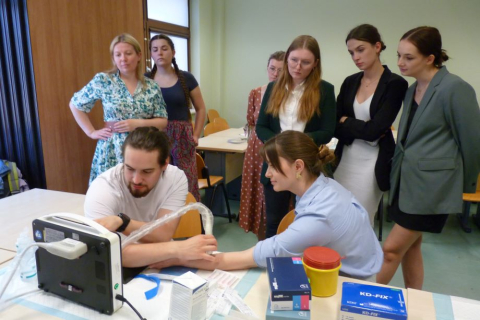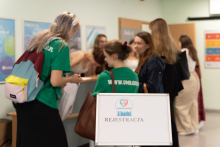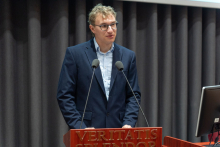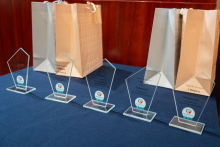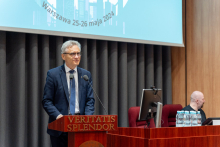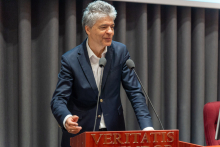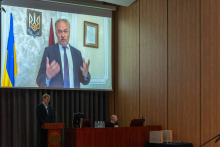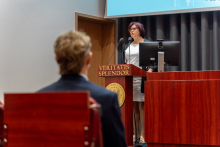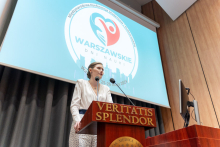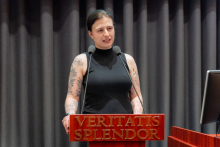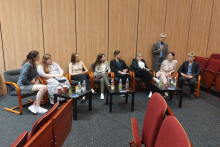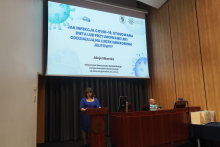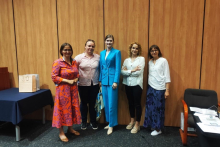Purpose of the „Warsaw Science Days”
The International Conference of Students and Postgraduates „Warsaw Science Days” took place on May 25 and 26. It was hosted by the “StatMed” Students’ Scientific Association operating at the Nursery Essentials Section of the Faculty of Health Sciences with the help of the “Start from the Basics” Students’ Scientific Association and the Nursery Essentials Section of the Faculty of Health Sciences.
Where did the idea to organize the event come from?
- Young Scientists are our future, and the aim of this event is to bring together people who are developing in the areas of scientific research. I hope that the „Warsaw Science Days” will become a permanent landmark in the conference calendar of our university - explained Dr. Lucyna Kwiećkowska, Chair of the organizational and scientific team of the „Warsaw Science Days”.
- When organizing this event, we had a clear thought in mind: create a place where young scientists in the field of health sciences will be able to present the results of their research, but also comment on topics that are interesting to them. I am happy to say that it was a success,” - added Gabriel Pesta, Vice-Chair of the organizational and scientific team of the “Warsaw Science Days”.
The event was held under the patronage of the Rector of the Medical University of Warsaw and the Dean of the Faculty of Health Sciences.
Active young scientists
During the two days of the congress young researchers presented results of their work in five thematic sessions. The sessions covered the fields of nutrition, nursing, medical rescue, public health with obstetrics and included presentations by postgraduates. We have heard 39 speeches, which made the event program multidisciplinary.
This was noticed by Prof. Zbigniew Gaciong, Rector of the Medical University of Warsaw, who praised both the hosts and the speakers during the official opening.
- I am proud that our students prepared the two-day conference - said the Rector -the meeting is an excellent showcase for the faculty, active students and their guardians who present interesting and valuable things to the outside world.
Expressions of appreciation were also expressed by Prof. Marek Kuch, Vice-Rector for Student Affairs and Education, who appreciated the students’ involvement.
- There are two ways to go through studies. You can go unnoticed or, and this is the true way, you can participate, want to be active - emphasized the Vice-Rector.
Congratulations for the hosts came also from MD, Prof., honoris causa doctor of Ukraine Roman Yatsyshyn, Rector of the Ivano-Frankivsk National Medical University; Barbara Gad-Karpierz, Medical Director for Hospital Affairs of the LUX MED Group; Aleksandra Hyży, representative of the University’s Postgraduate Self-government; and Julia Krzemińska, Chair of the Student Self-government of the Faculty of Health Sciences.
Awards and distinctions for the best presentations
Each session ended with the presentation of the main award and distinctions for the best speeches.
- In the “Nutrition” session, the award went to Małgorzata Kuczyńska for her presentation “The impact of extraction methods on the antioxidant activity of extracts of selected dishes”. The distinction went to Julia Redlicka for her presentation “Diet-dependent factors contributing to the development of male infertility – the impact of diet on semen quality”;
- In the “Nursing” session, the award went to Karolina Królik for her presentation “Quality of life and functioning in the disease of a young patient with suspected panniculitis”. The distinction went to Gabriel Pesta for his presentation “Nursing students’ perception of death”;
- In the “Medical rescue” session, the award went to Kornelia Sokołowska for the presentation on “The role of selected psychosocial factors and the work capacity of paramedics”. The distinction went to Olga Kunecka for the presentation “Todd’s palsy – does a neurological patient [should always be considered a stroke victim by the Medical Rescue Team?”;
- In the “Public health and obstetrics” session, the award went to Alicja Sikorska for her presentation “How do COVID-19 infection, diet or medication affect the human intestinal microbiome?”. The distinction was awarded to Iryna Stanislavska for her presentation “The relationship between Helicobacter pylori infection and vomiting of varying severity in pregnant women”;
- In the “Postgraduate” session, the award went to Monika Walec for her presentation “Profile of pregnant women using mobile applications monitoring the course of pregnancy and the impact of their use on the sense of security, life satisfaction and social support”. There were also two distinctions. One distinction was awarded to Adriana Szulińska for her presentation “Protein intake from the diet and the content of body fat among women undergoing treatment for infertility”. The other one went to Alicja Mińko for her presentation “The importance of selected myokines in predicting the length of rehabilitation of patients after COVID-19 infection”.
How do students want to be taught? A debate
Not only students, but also teachers and university authorities are looking for answers to this question. Rector Prof. Zbigniew Gaciong emphasized that he was pleased to have the opportunity to listen to the students’ voices. He also expressed hope that perhaps the discussion would suggest how to improve quality and effectiveness in teaching.
- The quality of education is an important element that we should pay attention to, and signals coming from students are the best method of verifying this quality - said the Rector.
The following students took part in the debate: Natalia Sapińska (nutrition), Karolina Zych (obstetrics), Julia Krzemińska (obstetrics and public health), Agata Piotrkowska (public health), Maciej Ciastoń, (medical rescue) and Mateusz Borecki (medical rescue).
The discussion was moderated by Emilia Ciastoń and Aleksandra Chlebowska, nursing students.
What were the students discussing?
The topics were very diverse: from student internships, through considerations about stationary and online classes, writing diploma theses, student surveys, continuing studies at the master’s level, ending with what an ideal lecturer should be like.
When asked about student summer internships in nutrition, Natalia Sapińska emphasized that organizing them on their own is a big challenge for students. She also noted that the very absorbing hospital internship in the third year of studies is difficult to combine with other classes, writing a bachelor’s thesis and work.
- Some of these internships could be postponed to the second year and combined with clinical nutrition and classes on wards - suggested Natalia, and added: - Knowledge and theory from the 2nd year of studies are lost, because practice is only available in the 3rd year.
When talking about stationary / online classes, students agreed that everything depends on the field. And that, although online classes are very convenient, direct contact with the instructor is very important. But stationary classes offer something else.
- Studying is not only about going to classes and listening, but also about the academic atmosphere. The fact that we are here at the university, we meet, influences our education and motivates us in general - said Agata Piotrkowska, praising the public health solution where most lectures are conducted online in real time while seminars and exercises are stationary.
When discussing their diploma theses, students expressed the need to increase the number of seminars preparing them to write their theses, among other things. They admitted that when starting out, they were like children in a fog, they had many questions and doubts, and the process itself was difficult for them.
An important voice in the discussion was the issue of student surveys. Students suggested that the functionality of this tool should be improved, which would make their colleagues more willing to use it. On this occasion, non-academic behaviors were also discussed. Julia Krzemińska appealed to students for solidarity.
- If a behavior is abusive, everything must be reported and the entire class should sign it because, otherwise, such a change will never come - emphasized Julia and added: - If we allow certain abuses, they will appear every year.
Agata Piotrkowska also recalled the support from student bodies: the departmental and central self-governments.
- This is a great tool that cannot be forgotten and sometimes it is not worth going through this whole situation alone.
The penultimate topic was the issue of choosing a university to continue studies at the second cycle (master’s level). Here, students emphasized that a well-arranged plan is crucial: classes should be cumulative to make it easier for students to work in their profession. The cost and form of classes also come into play – students prefer to learn online, especially since they treat second-cycle studies as studies expanding knowledge, not practical ones.
Karolina Zych, an obstetrics student, also drew attention to the social aspect: place of residence, family, plans for the future: - Girls get engaged, return to their hometowns and want to pursue their careers differently.
The last point of the discussion – the characteristics of an ideal lecturer. What did the students point out? The lecturer should be open to young people, flexible and straightforward. One from whom you want to learn, who spreads motivation and passion.
- Ideal lecturers talk about their mistakes, and we remember more with this attitude - emphasized Maciej Ciastoń.
- The ideal lecturer has to be human - said Mateusz Borecki - He or she must remember that they also learned, also started. They do not treat the student as a ‘necessary evil’ but offers support and understands that the student has his or her own problems and experiences.
The Rector’s voice in the debate
Rector Prof. Zbigniew Gaciong was listening to the students’ discussion the whole time. At the end he addressed many issues raised by students. First of all, he admitted that the university’s mechanisms for assessing education should be strengthened.
- Without a doubt, what is a serious problem: lack of feedback from students and lack of agency in student opinions. This is something that needs to be improved in the next years.
There were also workshops during the conference: communication for medics, led by Magdalena Nowak from the Medical Communication Department; performing injections using an ultrasound machine, led by Aleksander Korzeniowski from the Polish Society of Infusion Nursing; starting a sole proprietorship, conducted by Dr. Lucyna Kwiećkowska from the Department of Nursing Basics, owner of COEUS Research & Education.
